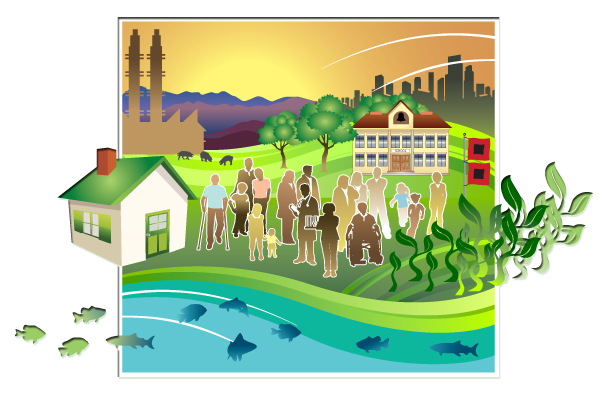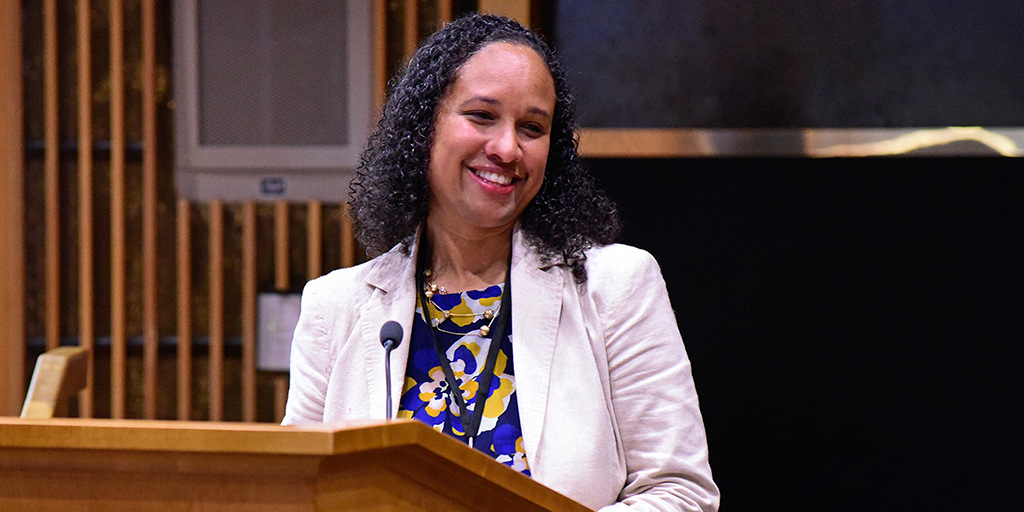Sustained Community Mobilization Leads to Neighborhood Benefits
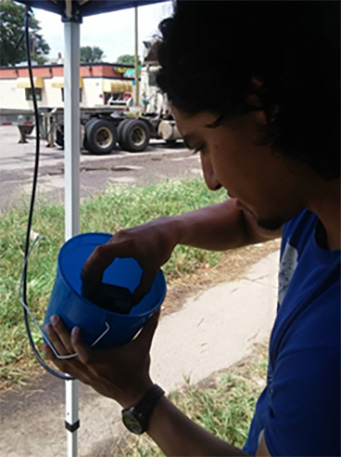
Residents of neighborhoods near the Gordie Howe International Bridge site collecting field data.
(Photo courtesy of Amy J. Schulz)
When planning began for a new international bridge to link Detroit’s Delray neighborhood and Windsor, Canada, nearby residents knew their lives would be affected, by both the construction and truck traffic. To protect their quality of life, residents launched the Southwest Detroit Community Benefits Coalition (CBC) in 2008, 10 years before construction of the Gordie Howe International Bridge began. They faced countless challenges, but their long-term, community-led research and advocacy, in partnership with researchers at the University of Michigan, have had lasting positive impacts, such as securing funding for a multi-phase health impact assessment.
Laying the Groundwork for Sustained Community Engagement
The residential areas near the bridge construction site in Detroit are predominantly communities of color and low-income households. Before construction, residents were already burdened by cumulative impacts from transportation and industrial activity, so they were concerned that the bridge would further negatively affect their well-being. Although a 2008 environmental impact statement concluded that regional air quality would improve during and after construction, it did not consider the disproportionate environmental health impact on the neighborhoods close to the construction site.
“Residents were concerned that the environmental impact assessment had essentially overlooked them,” said Simone Sagovac, CBC’s lead organizer. “The CBC had already collected data that showed residents had health concerns about the bridge that weren’t addressed in the impact assessment."
Next, the CBC focused on informing decision-makers and sharing residents’ concerns by engaging in various activities such as testifying at state hearings about the bridge, leading tours for elected officials to humanize land use decisions, and conducting community-led studies on air quality and health.
In 2015, the CBC conducted a brief quality of life survey. It revealed that residents had bridge-related concerns that touched on several areas, such as financial, safety, and health. The CBC then sought partnerships with public health researchers and survey experts from the University of Michigan to conduct more rigorous data collection.
In 2017, the CBC and its academic partners launched another, larger survey that focused specifically on health concerns associated with the bridge. Natalie Sampson, associate professor at the University of Michigan-Dearborn, worked closely with Sagovac to ensure that the survey was designed collaboratively with community residents and the CBC.
“Residents worked with researchers and students to design the survey questionnaire and methods, conduct the household surveys, and interpret the findings,” said Sampson. “Findings from this survey provided a springboard for one of the CBC’s subsequent requests to local and state leaders – a health impact assessment, which is well-suited to assess local social and health concerns in the context of a planned development project.”
The Health Impact Assessment
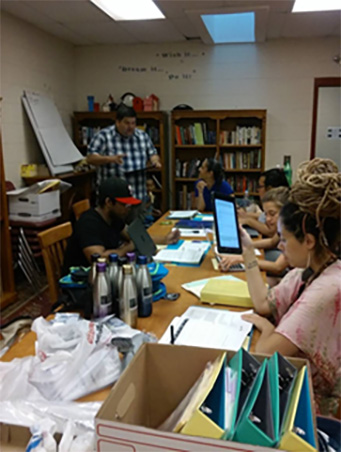
Residents of neighborhoods near the Gordie Howe International Bridge site analyzing data on truck counts and air quality.
(Photo courtesy of Southwest Detroit Community Benefits Coalition (CBC))
As part of a multimillion-dollar agreement between the city of Detroit and the state of Michigan, which came about in large part because of sustained community mobilization and CBC efforts, funds were allocated for a three-phase health impact assessment, as well as for other community benefits like air monitoring and home mitigation programs.
“Since the CBC had been active for so long, we had the community and political ties to advocate for a health impact assessment,” said Angela G. Reyes, Executive Director of Detroit Hispanic Development Corporation, which, together with other community organizations and the CBC, was part of community mobilization. “Getting support for the assessment was a major milestone because it would provide real data from the residents who would be impacted most. Additionally, it would pave the way for us to make recommendations for mitigation and community benefits.”
The baseline health impact survey was administered in 2018, while the second and third phases will occur during construction and after the bridge’s completion. Strong relationships between academic and community partners created a sense of trust, which helped with survey administration.
“It was essential that the health impact assessment captured the concerns and experiences of residents. Meeting several times to discuss issues, review drafts of the questions, and pilot test the questionnaire helped ensure the survey adequately captured residents’ concerns,” said Amy J. Schulz, a professor at the University of Michigan School of Public Health who was involved in the process. “Furthermore, the survey was administered by a team of bilingual community residents who received extensive training in interviewing and human subject protections. This was central to building trust and engaging the community.”
The full assessment was published by the Detroit Health Department in 2019, with recommendations for decreasing residents’ exposure to pollution by enforcing truck idling laws and mindfully designing truck routes, and for providing funds to help residents relocate.
The community-academic team recently published a paper, Mobilization for Community Benefits to Assess Health and Promote Environmental Justice near the Gordie Howe International Bridge, which highlights select findings and recommendations. For example, findings related to asthma informed recommendations about spatial buffers between heavily trafficked roadways and residential areas. The CBC, in making this recommendation and others, focused on protecting community residents, and will continue doing so as bridge construction progresses.
The Gordie Howe Community Mobilization as an Important Case Study

Are you enjoying the PEPH newsletter? Are there topics you'd like to see discussed more often? Please take a few minutes to provide feedback.
The community-academic team published this paper as an important case study. There are no universally accepted health impact assessment guidelines and no standards for identifying cumulative effects related to transportation infrastructure. Even without such standards, the case study shows how community-led efforts resulted in specific strategies for reducing potential adverse health impacts and for securing funding for mitigation efforts and other community benefits. Its three-phase aspect is important because it allows public health officials and government agencies to understand changing contexts and to make recommendations over time.
Southwest Detroit communities played a central role in shaping bridge-related policies that greatly affect them, and they will continue to do so as construction progresses. According to Schulz, the strategic use of health impact assessments to monitor and inform efforts around infrastructure projects can increase environmental justice in disproportionately impacted communities. However, ongoing collaboration between government, academic, and community leaders is needed to translate findings into meaningful outcomes.
Mobilizing Public Health to Achieve Environmental Justice: Webinar Now Available
The final webinar in the American Public Health Association’s series on advancing racial equity raised awareness of the impacts of environmental racism. Presenters spoke about historic and systemic issues that have disproportionately affected communities of color, the importance of environmental justice initiatives, and strategies to address environmental racism. A recording of the webinar is now available.
Applications Due for Mixed Methods Research Training Program for Health Science Researchers
Applications are being accepted until January 19 for the Mixed Methods Research Training Program for the Health Sciences (MMRTP), which is funded through the NIH’s Office of Behavioral and Social Science Research. Selected applicants will be paired with mixed-methods consultants, receive access to webinars and other resources, and attend an in-person retreat in the summer of 2021. At the retreat, MMRTP Scholars will meet faculty and receive feedback on their projects. The Mixed Methods Research Training Program for the Health Sciences (MMRTP) describes MMRTP Scholars’ skill, experience, and career levels.
Mixed methods research can give health science researchers a robust understanding of a research problem by combining quantitative and qualitative data collection and analysis, such as when a researcher gathers both quantitative and qualitative data to assess resident reactions to newly implemented community programs.
Submit Your Symposium Proposals for the International Society of Exposure Science’s Annual Meeting
The International Society of Exposure Science is now accepting symposium proposals for its 31st annual meeting, which will be hosted virtually August 30 – September 2, 2021 with the theme of Multisector Engagement for Addressing Emerging Environmental Exposures. The meeting will facilitate discussion on how multiple sectors might better respond to complex and multidisciplinary issues in exposure assessment and environmental health through science and policy implementation. The deadline for proposal submission has been extended to January 29.
Early Stage Investigators Invited to Apply to the Health Disparities Research Institute Program
The National Institute on Minority Health and Health Disparities (NIMHD) will host its five-day virtual course, Health Disparities Research Institute (HDRI), in August. HDRI supports the research career development of early-career minority health and health disparities research scientists. The program will have seminars, a mock grant review, lectures on minority health and health disparities research, and small group discussions. Talks will focus on the etiology of health disparities, methods and measurement, and intervention and implementation research. Additionally, participants will receive consultation on developing a research interest into a grant application. Applications will be accepted from February 1 to March 8.
Equity at Center of Revised 10 Essential Public Health Services
The de Beaumont Foundation, Public Health National Center for Innovations (PHNCI), and a Task Force of public health experts, recently revised the 10 Essential Public Health Services framework, originally created in the mid-1990s, to explicitly recognize that equity is at the root of ensuring optimal health for all. The new framework places “equity,” rather than “research,” at the center of the wheel of activities that public health systems should carry out in all communities.
Most activities remain fundamentally unchanged. The only service that changed significantly was the last service, which shifted from a focus on research to maintaining a strong public health infrastructure. The new framework also states that Essential Public Health Services “actively promote policies, systems and services that enable good health and seek to remove obstacles and systemic and structural barriers, such as poverty, racism, gender discrimination and other forms of oppression.”
Details about the process of updating the framework, a recording of the launch event, and other supporting materials can be found on PHNCI’s Essential Public Health Services framework PHNCI website.
Final NIH Policy for Data Management and Sharing
NIH’s new policy on data management and sharing, which addresses the need for the global science community to openly share scientific data, requires researchers to prospectively plan for managing and sharing data generated with NIH funds. After the policy goes into effect in January 2023, researchers will be required to submit Data Management and Sharing Plans and comply with ICO-approved plans. The policy also sets the expectation that data sharing is a fundamental part of the research process.
The new requirements were created through a stepwise process that included multiple opportunities for public feedback and in collaboration with the research community, including researchers, institutions, data providers and users, research participants, infrastructure developers, Tribal Nations, and others.
For more details, read the Statement on Final NIH Policy for Data Management and Sharing and the notice (NOT-OD-21-013).
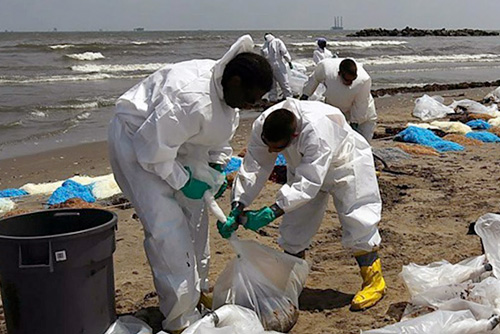
PEPH Environmental Health Chat Podcast Series
NIEHS Program Builds Careers, Changes Lives
PEPH Environmental Health Chat Podcast Series
NIEHS Program Builds Careers, Changes Lives
In this podcast, NIEHS Program Builds Careers, Changes Lives, hear about how the Environmental Career Worker Training Program (ECWTP) enhances life skills, creates jobs, and provides sustainable career opportunities for underserved populations. You’ll hear from the program’s director and a program graduate about ECWTP’s life-changing impacts across the country. 2020 marks the 25th anniversary of the program, which prepares trainees for jobs in environmental cleanup, construction, hazardous waste removal, and emergency response.
You can find more podcasts on the Environmental Health Chat webpage or subscribe to the series on iTunes. We want your feedback! Send comments and ideas for future podcasts to [email protected].

PEPH Grantee Highlight
Rachel Morello-Frosch, Ph.D.
Rachel Morello-Frosch, Ph.D., studies California’s drinking water issues and leads the University of California, Berkeley’s Superfund Research Program’s Community Engagement Core – Water Equity Science Shop (CEC-WESS). Her interest in studying drinking water stemmed from the state’s six-year drought that ended in 2017. Morello-Frosch, whose research is guided by resident concerns, works closely with the Community Water Center (CWC), a California organization that supports community-driven water solutions.
Recently, CEC-WESS and CWC launched the Drinking Water Tool, which is meant to be used by communities and decision makers to identify areas where water quality, access, and safety may be a concern. The tool also identifies communities in which households rely on private, unregulated groundwater for wells. Researchers can use this data to improve private well-monitoring efforts.
Funding Opportunites
Pediatric and Reproductive Environmental Health Scholars program (K12 Independent Clinical Trial Not Allowed)
Provides new healthcare professionals with state-of-the-art environmental health training that blends academic research and practice-based applications in real-world settings. The program will provide supervised research career development opportunities to assist junior faculty. The goal of the Pediatric and Reproductive Environmental Health Scholars (PREHS) program is to create of a strong network of healthcare professionals who possess the skills and knowledge to address the complexities of pediatric and reproductive environmental health. Applications for this award must propose a comprehensive career development and research plan that: (1) has environmental health research relevant to pediatrics and reproductive health and is within the mission of the NIEHS, (2) serves as a mechanism for gaining research competencies in environmental medicine related to pediatrics and reproductive health to advance scholars' medical knowledge, patient care, interpersonal and communication skills, professionalism, and systems-based practice, and (3) provides scholars with the necessary environmental public health and clinical expertise to advance their careers as academic researchers and physician scientists, such as improving scientific and grant writing skills, developing effective advocacy skills, and fostering expertise in risk assessment and risk communication.
Deadline: January 15, 2021
Letter of Intent: December 15, 2020
Research on the Health of Women of Understudied, Underrepresented and Underreported (U3) Populations (Admin Supp Clinical Trial Optional)
Administrative supplements to support research highlighting health disparities among women in the US who are underrepresented, understudied, and underreported (U3) in biomedical research. The common pathways for the manifestations of ill health and disease, differential risk, risk exposure, resilience, morbidity, and mortality at the individual, community, and national levels are areas of particular research interest. Proposed research must address at least one objective from the strategic goals 1, 2, or 3 of the 2019-2023 Trans-NIH Strategic Plan for Women's Health Research "Advancing Science for the Health of Women."
Deadline: January 21, 2021
Administrative Supplements for Summer Research Experiences for Students and Science Teachers
Supports summer research experiences in the environmental health sciences for high school students; college undergraduates; master’s degree candidates; medical students; secondary school science teachers; and science professors from community, junior, or technical colleges as well as primarily undergraduate institutions. These supplements are intended to introduce students and teachers to research in the environmental health sciences that would not otherwise be available to them through their regular course of study.
Deadline: January 25, 2021
New Cohorts for Environmental Exposures and Cancer Risk (CEECR; UG3/UH3 Clinical Trial Not Allowed)
Supports innovative scientific research in new prospective Cohorts for Environmental Exposures and Cancer Risk (CEECR) to addresses knowledge gaps in cancer etiology and carcinogenesis processes with a focus on environmental exposures, as well as the genetic, lifestyle, and behavioral factors that modify risk across diverse populations. Applicants are encouraged to use validated and reproducible innovative techniques to measure environmental exposures relevant to the proposed scientific research questions. The cohorts should include racial/ethnic minorities and understudied populations to address the unequal burden of cancer that currently exists in those populations. This FOA is published in parallel with RFA-CA-20-050 “New Cohorts for Environmental Exposures and Cancer Risk (CEECR) Coordinating Center (U24 Clinical Trial Not Allowed)”, which supports a Coordinating Center. New prospective cohorts and the Coordinating Center funded under these FOAs together will constitute the CEECR program. The main role of the CEECR Coordinating Center will be the integration of efforts across the CEECR program and the facilitation of research activities. The CEECR Coordinating Center will be expected to do this by communication, coordination, and collaboration across the awarded cohorts, in coordination with NIH program staff, and relevant community-based organizations.
Deadline: January 29, 2021
Letter of Intent: Due December 15, 2020
NIEHS Support for Understanding the Impact of Environmental Exposures on Coronavirus Disease 2019 (COVID-19)
Addresses the urgent need for mission-relevant research to understand the impact of environmental exposures on Coronavirus Disease 2019 (COVID-19) and its causative agent, the virus SARS-Cov-2. NIEHS is particularly interested in applications that will provide insight into the role of environmental exposures in pathogenicity, transmission, individual susceptibility, or prevention and intervention strategies. Examples of environmental exposures relevant to the NIEHS mission include: toxic chemicals, air pollutants, second hand tobacco smoke, e-cigarette vapors, metals, and other environmental chemical exposures that may impact health outcomes. NIEHS is accepting applications addressing COVID-19 through the administrative supplement, urgent competitive revision, and time-sensitive mechanisms.
Deadlines: October 1, 2020; November 2, 2020; December 1, 2020; January 4, 2021; February 1, 2021; March 1, 2021; April 1, 2021; May 3, 2021
Addressing Health Disparities Among Immigrant Populations Through Effective Interventions (R01 Clinical Trial Optional)
Supports research to design and implement effective interventions to enhance health advantages and reduce the health disparities among U.S. immigrant populations, particularly migrant workers, recent and first-generation immigrants. This announcement calls for multidisciplinary/multilevel research focusing on the design and implementation of effective interventions that will address immigrant-specific factors to reduce health disparities. A framework to demonstrate the multidomain, multilevel factors that may influence health disparities is available here. A life-course perspective is encouraged with interventions focusing attention on transition points across the lifespan and associated risk and protective factors for immigrant populations. Projects should involve collaborations among relevant stakeholders in U.S. immigrant population groups, such as researchers, community organizations, healthcare providers, public health organizations, consumer advocacy groups, and faith-based organizations. Projects must focus on immigrants from one or more NIH-designated populations that experience health disparities in the U.S., which include racial and ethnic minorities (Blacks or African Americans, Hispanics/Latinos, Asian Americans, and Pacific Islanders).
Deadlines: February 5, 2021; June 5, 2021; October 5, 2021
Addressing the Etiology of Health Disparities and Health Advantages Among Immigrant Populations (R01 Clinical Trial Not Allowed)
Supports innovative research to understand factors uniquely associated with the immigration experience that contribute to health disparities or health advantages among U.S. immigrant populations, particularly migrant workers, recent and first-generation immigrants. This announcement calls for multidisciplinary research to address the specific underlying causes and mechanisms of health disparities and health advantages. A framework to demonstrate the multidomain, multilevel factors that may influence health disparities is available here. Projects should involve collaborations among relevant stakeholders in U.S. immigrant population groups, such as researchers, community leaders and organizations, public health organizations, consumer advocacy groups, faith-based organizations, and healthcare providers. Projects must focus on immigrants from one or more NIH-designated populations that experience health disparities in the U.S., which include racial and ethnic minorities (Blacks or African Americans, Hispanics/Latinos, Asian Americans, and Pacific Islanders).
Deadlines: February 5, 2021; June 5, 2021; October 5, 2021
Dissemination and Implementation Research in Health (R01 Clinical Trial Optional)
Supports innovative approaches to identifying, understanding, and developing strategies for overcoming barriers to the adoption, adaptation, integration, scale-up and sustainability of evidence-based interventions, tools, policies, and guidelines. Additionally, there is a benefit in understanding circumstances that create a need to stop or reduce (“de-implement”) the use of interventions that are ineffective, unproven, low-value, or harmful. This FOA invites research grant applications that will identify, develop, test, evaluate, and/or refine strategies to disseminate and implement evidence-based practices (e.g. behavioral interventions; prevention, early detection, diagnostic, treatment and disease management interventions; quality improvement programs) into public health, clinical practice, and community (e.g., workplace, school, place of worship) settings. Studies to advance dissemination and implementation research methods and measures are also encouraged.
Deadlines: February 5, 2021; June 5, 2021; October 5, 2021
Letter of Intent: Due 30 days prior to the application due date
Superfund Hazardous Substance Research and Training Program (P42 Clinical Trial Optional)
Supports problem-based, solution-oriented research Centers that consist of multiple, integrated projects representing both the biomedical and environmental science and engineering disciplines; as well as cores tasked with administrative (which includes research translation), data management and analysis, community engagement, research experience and training coordination, and research support functions. The scope of the Superfund Research Program Centers is taken directly from the Superfund Amendments and Reauthorization Act of 1986, and includes: (1) advanced techniques for the detection, assessment, and evaluation of the effect on human health of hazardous substances; (2) methods to assess the risks to human health presented by hazardous substances; (3) methods and technologies to detect hazardous substances in the environment; and (4) basic biological, chemical, and physical methods to reduce the amount and toxicity of hazardous substances.
Deadline: February 15, 2021
Letter of Intent: January 15, 2021
Outstanding New Environmental Scientist (ONES) Award (R01 Clinical Trial Optional)
Identifies and supports the most talented Early Stage Investigators (ESIs) who intend to make a long-term commitment to research in the Environmental Health Sciences by assisting them in launching an innovative research program focused on understanding the effects of environmental exposure on people’s health. Research projects proposed will be expected to have a defined impact on the environmental health sciences and be responsive to both the mission of the NIH and, specifically, to the mission of the NIEHS and the 2018-2023 Strategic Plan: Advancing Science, Improving Health: A Plan for Environmental Health Sciences Research (7MB). Applicants should consult the Strategic Plan to ensure that the proposed research addresses the goals and priority areas of the NIEHS. This Strategic Plan focuses on discovering how the environment affects people in order to promote healthier lives, conducting and supporting the very best environmental health sciences research in alignment with real-world public health needs, and translating science findings into knowledge that can inform real-life individual and public health outcomes. A variety of scientific disciplines, including basic, mechanistic, clinical, epidemiological, computational, engineering, and/or health risk communication approaches, can be used to advance the Strategic Plan. Only one application per School or College within a University is allowed.
Deadlines: February 26, 2021; February 24, 2022; February 24, 2023
Letter of Intent: Due 30 days prior to the application due date
Environmental Influences on Aging: Effects of Extreme Weather and Disaster Events on Aging Populations (R01 Clinical Trial Optional)
Supports research to advance our understanding of the impact of extreme weather and disaster events in aging human populations. This FOA (PAR-19-250) and its companion FOA (), which focuses on underlying mechanisms of aging utilizing animal models, will help explicate the behavioral, biological, and socioecological processes that occur during extreme weather or disaster events that affect aging processes. Through the integration of the population studies and the companion mechanistic studies FOA, the goal is to improve the health and well-being of older adults via increased knowledge about extreme weather and disaster preparedness, response, and recovery.
Deadline: July 7, 2020; November 9, 2020; March 8, 2021
Letter of Intent: Due 30 days prior to the application due date
Application of Artificial Intelligence and Machine Learning for Advancing Environmental Health Sciences (R41 Clinical Trial Not Allowed)
Solicits Phase I Small Business Technology Transfer (STTR) grant applications from small business concerns (SBCs) to develop promising methodologies using Artificial Intelligence (AI) and Machine Learning (ML) approaches to advance environmental health research and decisions. When further developed and validated, these methodologies or approaches should improve the accuracy of toxicity prediction, help in prioritizing chemicals for more relevant or targeted testing, identify and/or fill data or knowledge gaps in toxicity assessment, and promote more comprehensive understanding of human exposure effects, susceptibility, and adverse health outcomes.
Deadline: March 29, 2021
Letter of Intent: February 28, 2021
Application of Artificial Intelligence and Machine Learning for Advancing Environmental Health Sciences (R43 Clinical Trial Not Allowed)
Solicits Phase 1 Small Business Innovation Research (SBIR) grant applications from small business concerns (SBCs) to develop promising methodologies using Artificial Intelligence (AI) and Machine Learning (ML) approaches to advance environmental health research and decisions. When further developed and validated, these methodologies or approaches should improve the accuracy of toxicity prediction, help in prioritizing chemicals for more relevant or targeted testing, identify and/or fill data or knowledge gaps in toxicity assessment, and promote more comprehensive understanding of human exposure effects, susceptibility and adverse health outcomes.
Deadline: March 29, 2021
Letter of Intent: February 28, 2021
Intervention Research to Improve Native American Health (R01 Clinical Trial Optional)
Supports research on interventions to improve health in Native American (NA) populations. This includes 1) etiologic research, where there is a significant gap in knowledge, that will directly inform intervention development or adaptations, 2) research that develops, adapts, or tests the efficacy or effectiveness of health promotion and disease prevention interventions, 3) research that tests culturally informed treatment or recovery interventions and 4) where a sufficient body of knowledge on intervention efficacy exists, research on dissemination and implementation that develops and tests strategies to overcome barriers to the adoption, integration, scale-up, and sustainability of effective interventions. Through this initiative, intervention and related research is sought to build upon community knowledge, resources, and resilience to test science-based, culturally appropriate solutions to reduce morbidity and mortality through identification and remediation of precursors to diseases and disorders and through culturally informed treatment.
Deadline: May 17, 2021; May 17, 2022; May 17, 2023
Letter of Intent: Due 30 days prior to the application due date
Native American Research Centers for Health (S06 Clinical Trials Optional)
Invites applications from federally recognized Tribes and Tribal organizations for the Native American Research Centers for Health (NARCH) initiative, which supports biomedical research and career enhancement opportunities to meet health needs prioritized by American Indian or Alaska Native communities. The NARCH initiative also supports research capacity building and the development of research infrastructure to enhance the biomedical research capabilities of these communities.
Deadline: July 24, 2020; June 24, 2021
Letter of Intent: Due 30 days prior to the application due date



